Collaboration in Health/Wellness: The Consortium and the Opioid Task Force
This Unique Initiative Has a Simple Mission: to Save Lives
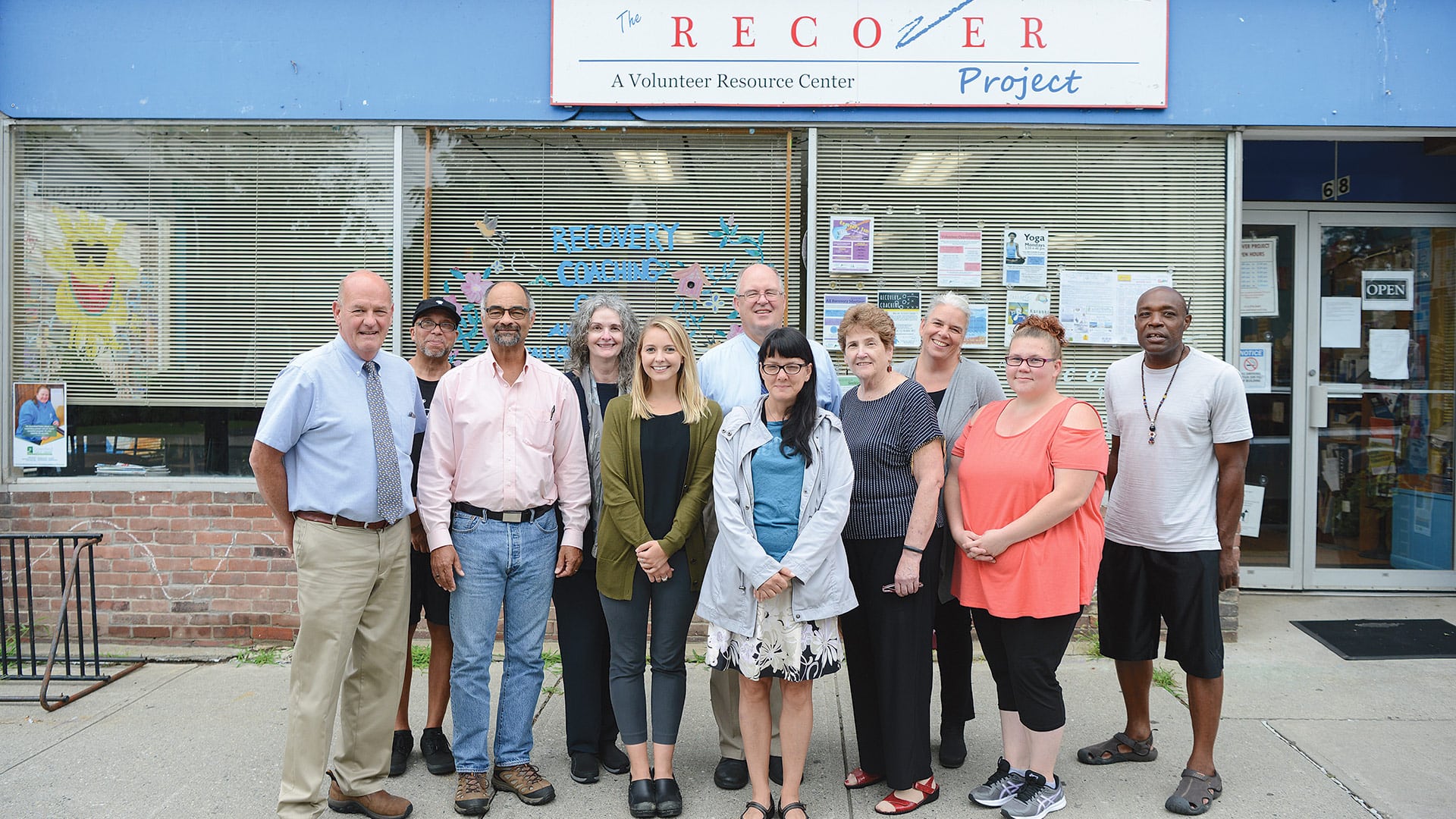
Larry Thomas remembers not knowing exactly what to say or how to respond.
He had just been encouraged to apply for a job as a peer coordinator and recovery coach for something called the Recover Project, a recovery support center operating in downtown Greenfield under the umbrella of the Western Mass. Training Consortium and funded by the Bureau of Substance Abuse Services in Massachusetts. Thomas paused, because the last job he held was as part of a work-release program operated by the Department of Corrections.
“I had never had a job as a free man, applying on my own,” he explained. “When they posted the job, people said I should apply. I said, ‘maybe I should, but I don’t even have a résumé.’ I did apply, but I was scared to put down the last place I worked, because I was still in jail.’”
Thomas, in applying and then earning the job, essentially put his past behind him and focused on solidifying his future, which is, by and large, what he encourages others to do as a recovery coach. He takes his ‘lived experience’ — that’s a phrase you’ll read often in this article — and puts it to work helping others combating addiction and trying to put their lives back together.
Thus, he’s become part of a huge, multi-faceted, truly groundbreaking collaboration forged by the Western Mass. Training Consortium and the Opioid Task Force of Franklin County and the North Quabbin Region.
Actually, he was part of it before he became an employee, as we’ll see.
But first, by ‘huge collaboration,’ we mean more than 300 public and private partners, representing law enforcement, the healthcare community, the court system, a host of nonprofit agencies such as the Recover Project, addiction specialists, and addicts themselves. Collectively, these partners have one overriding mission — to save lives.
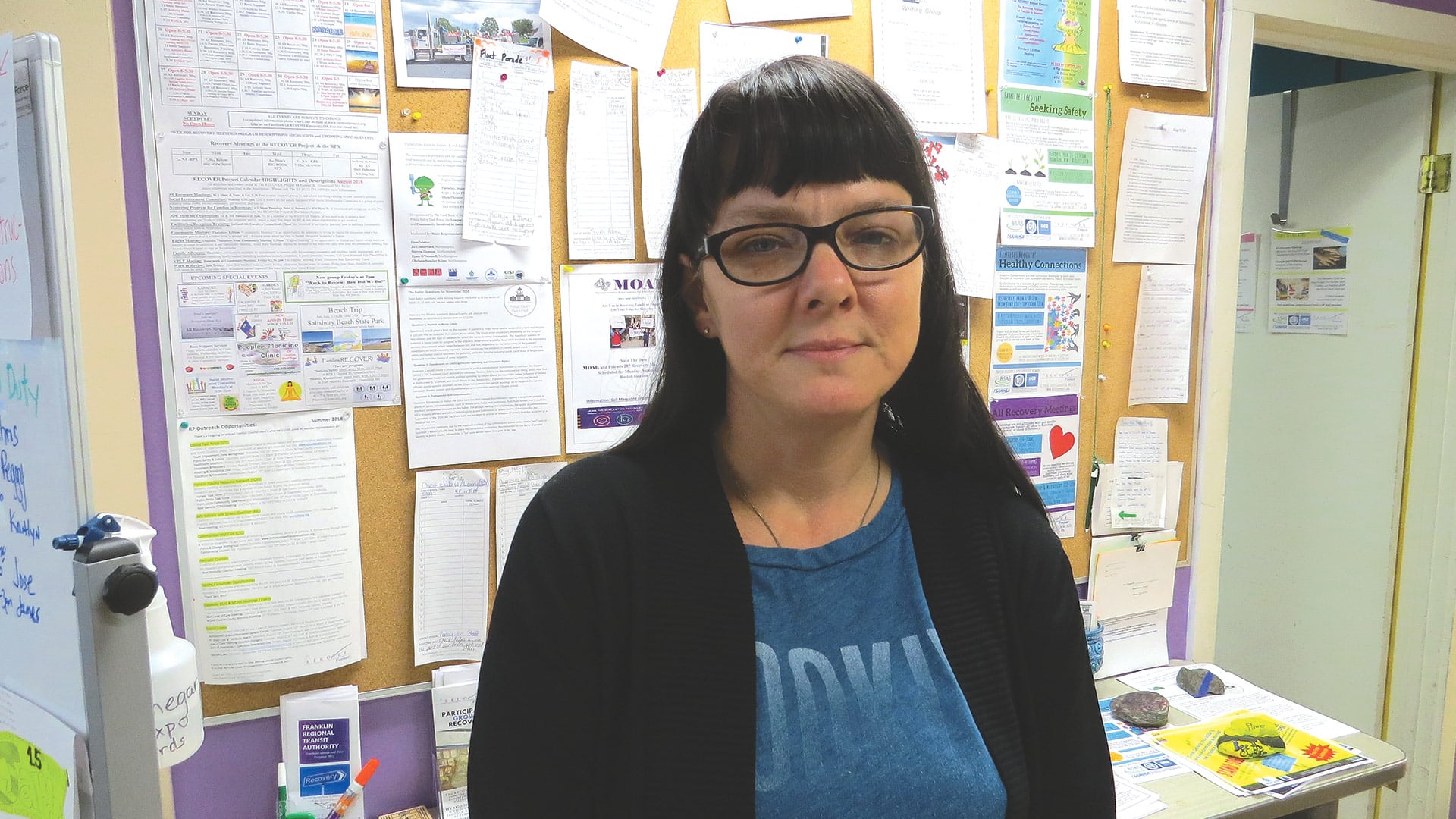
And they are doing just that by effectively bringing an entire community together to combat a problem that that is prevalent across the country, but especially in rural areas like Franklin County.
As John Merrigan, register of Franklin Probate and Family Court, recalls, in the summer of 2013, all those players were essentially confronting the opioid epidemic separately and in their own ways — and not making much headway, really. By the end of the year, they were confronting it together, collaborating, communicating, building bridges, combining resources, and fighting the problem not by locking people up but by using lived experiences, peer-to-peer counseling, and even massage and acupuncture to help them find a pathway (another word you’ll read often) to treatment and recovery.
As they talked with BusinessWest about the collaboration at the Recover Project’s facility on Federal Street in Greenfield, the many assembled players spoke with one voice about the power of such peer-to-peer counseling and the even greater power of a community coming together to address a problem that has touched everyone in that community directly.
Sarah Ahern, another peer leader and recovery coach, lost two family members to overdose, and remembers feeling a wide range of emotions, but especially anger at a system she felt had failed miserably to prevent such a tragedy.
“I’m that person who decided to bang on the doors from the outside, because I was really angry, and I saw the system was broken,” she recalled. “But someone told me — and I’m pretty sure it was someone here at the Recover Center — you can’t make change that way; you have to make change from the inside out.
“So I started attending task-force meetings,” she went on. “And I met all kinds of wonderful people who are just trying to figure out a solution.”
“I’m that person who decided to bang on the doors from the outside, because I was really angry, and I saw the system was broken. But someone told me — and I’m pretty sure it was someone here at the Recover Center — you can’t make change that way.”
‘Creating change from the inside out.’ That’s one way of describing what this collaboration is doing. But there are many others.
David Sullivan, Northwestern district attorney, had his own way.
“Going back five years, there was recognition on my part, and also by [Franklin County] Sheriff Christopher Donelan, that there needed to be a fundamental shift in the approach to addiction,” he said. “We needed to look at this as a chronic disease and not be looking toward incarceration and criminal sanctions. So the emphasis has been on treatment and recovery, and we’ve put a lot of resources into moving in that direction.”
Deborah McLaughlin, coordinator of the Opioid Task Force, may have summed it up best when she said, “people creating these terrible drugs have no shortage of creativity on their end, so we have to respond in kind to keep ahead of this as much as we can.”
In most all ways, this collaborative effort is creative and truly cutting-edge in its approach to combating opioid and heroin addiction. And it is becoming a model that other community task forces are trying to emulate. Indeed, individuals and groups from across the Commonwealth as well as other New England states, New York, and Ohio have reached out to learn more about this collaboration and its unique approach.
The crisis is far from over, said all those we spoke with. But they were also in agreement that the energy and, more importantly, the hope created to date is fueling general optimism in a region where that commodity has been in short supply in recent years.
And for generating that optimism, all those involved in this collaborative are true Healthcare Heroes.
Coming Together
Anthony Bourdain, the colorful host of the Parts Unknown series who tragically took his own life earlier this year, came to Franklin County in the fall of 2014 to learn about the task force and the many players involved in this collaboration.
He immediately sensed that it was something different and something special, and described the collaborative as a grass-roots response — people coming together to find a “community-based solution to what is finally being recognized as a public-health crisis rather than just a criminal-justice problem.”
He would go on to say, “‘war on drugs’ implies us vs. them, and all over this part of America, people are learning that there is no ‘them’ and only ‘us.’ And we have to figure this out together.”
Nearly four years later, those words seem prophetic. The nation now considers opioid addiction a public-health crisis, and the many players involved in this collaborative effort in Franklin County clearly understand that there is only ‘us.’
Indeed, in a small community like this, almost everyone has a family member, friend, or co-worker who is addicted to opioids or has overdosed. And this closeness to the problem, this familiarity with tragedy, certainly helped bring people together behind that mission to save lives, said Merrigan.
“The district attorney, the sheriff, and myself, who had worked closely together on a number of initiatives in the past, really saw our community being uprooted by the opioid epidemic,” he explained, flashing back roughly five years. “We saw it within our families, within our neighborhoods, and we knew we had to respond and convene members of the law-enforcement community, the medical community, the court community, and the recovery community.”
That response started with a phone call he placed to Linda Sarage, then the director of the Recover Project, and a request — more like a plea — to start a dialogue, something that didn’t exist between the two entities before that call.
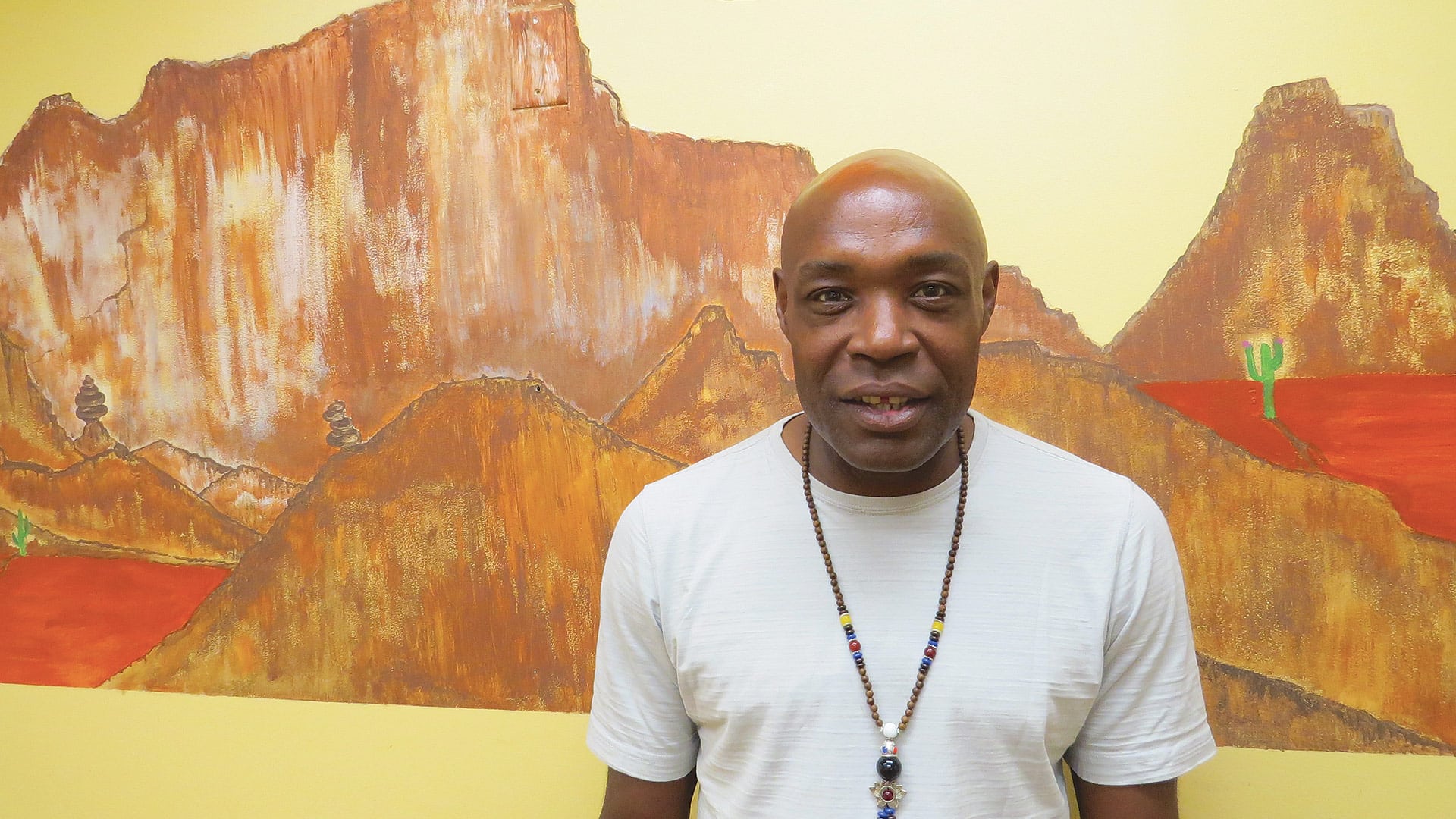
“He introduced himself to me,” said Sarage, noting that there was some irony in the fact that an introduction was needed. “he knew of the work that the Recovery Project had been doing — we been doing some re-entry work at the jail and some re-entry work in the community that really put the importance of recovery out there.”
Those initial talks led to many more and eventually what D.A. Sullivan called an epiphany about the importance and power of recovery communities to finding a long-term solution to the addiction problem.
“You can’t incarcerate your way out of this crisis,” said Sullivan. “I think that people have come around to this, although others still need to be convinced. It’s absolutely clear to all of us that, with really good treatment and recovery, people can lead productive lives and not be wrapped up into the criminal-justice system; the last thing I want to see is people going to court and going to jail — I’d rather see them go to treatment and find that pathway to recovery.”
Which brings him to the subject of lived experience and recovery coaches like Larry Thomas, who are, Sullivan said, some of the real keys to changing the equation in this ongoing battle.
“Five years ago, we were flat-footed — we did not know how to approach this problem. Our system was built for alcohol situations and domestic-violence situations, and the one thing we’re seen across the spectrum — medical, the court community, the recovery community — is the peer-mentor piece,” he explained. “That lived experience, as opposed to a probation officer in the court system, has many advantages. A recovery coach can approach someone who’s struggling; it’s people helping people, and that’s the bottom line, because there’s no magic bullet otherwise to help us cope with this.”
This is what the architects of the collaborative had in mind, said Mary Lou Sullivan, executive director of the Western Mass. Training Consortium, a Holyoke-based agency which has a stated mission of “creating conditions in which people with lived experience pursue their dreams and strengthen our communities through full participation.”
And each word in that phrase is important, she said, starting with that word ‘conditions.’
“A lot of what’s happened in our society is that people are looked at as if they’re broken and they need to be fixed,” she explained. “And we feel like a lot of that is response to life and what’s going on in the world. The opposite of addiction is connection; you can’t separate out people and say, ‘what can we do to tinker with you and fix you?’ That’s a fundamental flaw in the way we go about things.
“So we try to turn the tables on that,” she went on, adding that the next key part of that phrase is ‘lived experience.’ Everyone has it, she said, and there are proven benefits to bringing people together who can share common experiences, whether its addiction, domestic violence, or significant health issues.
Then, there’s the ‘strengthen our communities through full participation’ part of that phrase, she told BusinessWest, echoing Sullivan and others when she said that the community is much stronger when people like Larry Thomas are involved with helping others and not incarcerated.
“It doesn’t serve us to have all these people in jail that we do in this country,” she said. “It would serve us much better if these people were part of the community.”
Parts of the Whole
As she talked, as others did, about the many ways the collaborative is changing the fight against addiction and generating momentum and progress, McLaughlin said groups working together can achieve much more than individuals and groups working independently of one another.
“We’ve been able to do things we wouldn’t be able to do ourselves,” she said, offering as examples everything from a ‘Building a Resilient Community’ event that focused on the role of trauma in one’s life, to a toiletry drive for individuals in recovery — an initiative that involved five locations, with donated items distributed to nine different organizations — to a recovery-friendly resource fair called ‘Where to Turn?’ involving more than 30 nonprofit agencies from the Greenfield, Franklin County, and North Quabbin areas.
And those represent just the tip of the iceberg, she said, adding that there have been a host of other initiatives ranging from a ‘bowling for recovery’ event to a program focused on recovery during the holidays.
Collectively, these events and others show how the community is coming together in this fight and grasping Bourdain’s wisdom when he said, “there is not them and only us.”
“There’s a groundswell of support for individuals impacted by opioid-use or substance-abuse disorder,” she said. “There’s support for families, there’s support for individuals, and I think we want to find out more about what it means to be a recovery-friendly community so that people feel that they are welcome here.”
This support takes many forms, from peer-to-peer counseling to a theater program, to the People’s Medicine Project, an emerging program of the consortium. This is a small but committed group of alternative-health practitioners, gardeners, social-justice advocates, and community members who believe that all people have a right to wellness and an empowered connection to their health.
Leslie Chaison, director of the project, said one of its main goals is to focus attention on the problem of pain and, more specifically, the over-prescription of opioid medications and the need to help people discover alternatives.
“We offer alternative therapies to people in recovery,” she said, adding, however, that the project has been hampered by a lack of funding and has been kept alive by the task force. “We have multiple therapies in our clinic, including acupuncture, massage, homeopathy, craniosacral therapy, herbal consults, and more.”
Through a grant from the task force, the project forged a partnership with Greenfield Community Acupuncture that has enabled a number of early-stage recovery individuals to receive acupuncture treatment for their pain.
“The feedback has been really great,” she said, adding that the project’s regular clinic, housed at the Recover Project and staffed by volunteers, has brought a variety of treatments to people in need.
Count Thomas in that group, and as one of the believers.
“We needed to look at this as a chronic disease and not be looking toward incarceration and criminal sanctions. So the emphasis has been on treatment and recovery.”
“Every Tuesday, they set this up back here,” he said referring to a space within the Recover Project. “There were lights and low music and all this stuff. I remember saying, ‘what is all this?’ and walking out; it took me a while to trust and just make an appointment.
“But I came to trust,” he went on. “And I have full-body massages, herbal medicine … they gave me tea, and it worked better than the medicine I was getting from CVS.”
Summing up the collaboration and the progress made to date, Sullivan said the most notable change has come in breaking down barriers and putting people in the same room — either literally or figuratively.
“In Franklin County, I think there were more silos than there were barns,” he explained. “This is really about good people communicating with other and working on solutions. It’s a big problem, and it still exists, but we’re seeing progress.
“It’s about having that day-to-day conversation with providers — ‘how do you link people up? How does a family find a place for a person to go for treatment? Where do they go for recovery?’ It’s all about these great conversations that are happening now that weren’t happening in the past.”
Bottom Line
Linda Ahern, that angry individual who started banging on doors from the outside out of frustration with a broken system, became emotional as she started talking about battling the problem from the inside — and about the progress made collectively.
“I’m just really proud of what we’ve done together with all our strengths and all the connections that we have,” she said, “and to really welcome people with lived experiences, and not in a token kind of way, but in a ‘your-voice-really-matters’ way.
“We’re setting precedents that are being looked at across the country,” Ahern went on. “I talk to people from all over who say ‘wow, you did that? — share it.’ And that’s what we do; we share the information so that someone in a state that’s not as progressive can do the same things that we are.”
With that, she spoke for everyone in the crowded room. Anthony Bourdain wasn’t there, of course, but in a way, he was — still reminding people that there’s ‘only us.’
Those involved in this massive collaboration don’t need such a reminder; they live and breathe it every day.
George O’Brien can be reached at obrien@businesswest.com

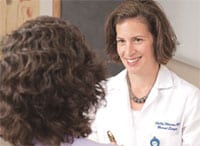
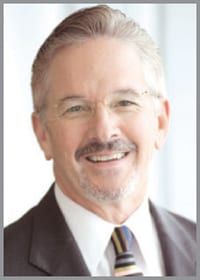
Comments are closed.